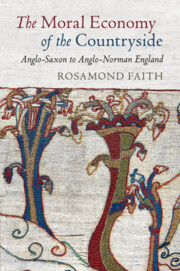Book contents
- Reviews
- The Moral Economy of the Countryside
- The Moral Economy of the Countryside
- Copyright page
- Contents
- Preface
- Abbreviations
- 1 Introduction: The Moral Economy
- Part I Rank
- Part II Reciprocity
- Part III Reputation and Witness
- Part IV The Wolf Sniffs the Wind
- Part V The Aftermath of Conquest
- Part VI In the World of the Manor
- 13 Establishing Custom
- 14 Thinking Feudally
- 15 From Rank to Class
- 16 Conclusion: Forward into the Past
- Appendix The Family Farm in Peasant Studies
- Bibliography
- Index
16 - Conclusion: Forward into the Past
from Part VI - In the World of the Manor
Published online by Cambridge University Press: 25 October 2019
- Reviews
- The Moral Economy of the Countryside
- The Moral Economy of the Countryside
- Copyright page
- Contents
- Preface
- Abbreviations
- 1 Introduction: The Moral Economy
- Part I Rank
- Part II Reciprocity
- Part III Reputation and Witness
- Part IV The Wolf Sniffs the Wind
- Part V The Aftermath of Conquest
- Part VI In the World of the Manor
- 13 Establishing Custom
- 14 Thinking Feudally
- 15 From Rank to Class
- 16 Conclusion: Forward into the Past
- Appendix The Family Farm in Peasant Studies
- Bibliography
- Index
Summary
The values of the pre-Conquest moral economy had derived their strength from the fact that they were widely held across society and are best understood as the response of people to their circumstances and to their ideas about their own history. After 1066 what had been a largely free peasantry became drawn into the orbit of a new entity, the ‘manor’, and by the late twelfth century for many this meant an obligation to supply lords with labour. The chapter then turns to the nature of resistance, enquiring why ordinary uneducated English people so often and so persistently claimed to be free. One relevant factor is a longstanding acquaintance with, and veneration for, the law. It was because peasants had shown themselves to be litigants that the legal definitions of villein status and tenure were developed. Another factor, respect for the official written record was a feature of rural life throughout the middle ages. The Norman Conquest had brought profound social change which entailed not only a new form of social relations, those of feudal tenure, but also a new kind of moral economy, that of ‘feudal thinking’. If peasants in the later middle ages felt that they had lost the freedom their predecessors enjoyed, they had good reasons for doing so.
- Type
- Chapter
- Information
- The Moral Economy of the CountrysideAnglo-Saxon to Anglo-Norman England, pp. 210 - 214Publisher: Cambridge University PressPrint publication year: 2019

